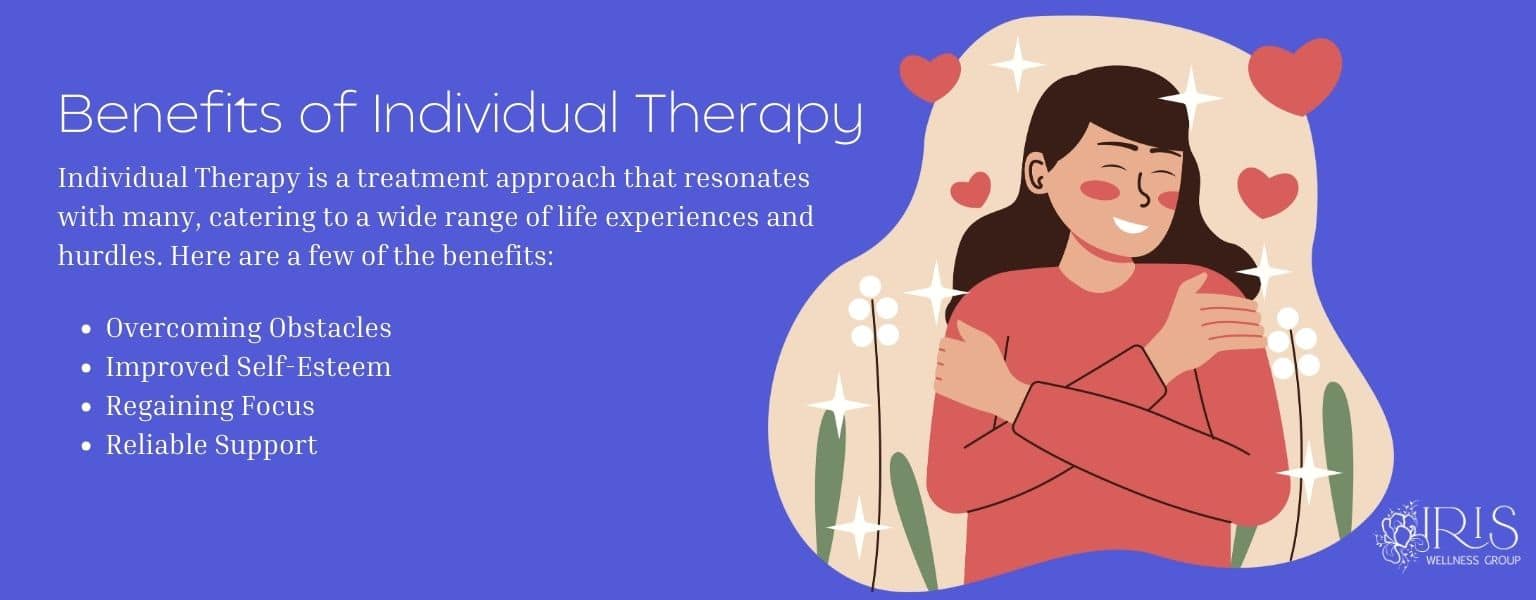Table of Contents
What is Individual Therapy?
Individual therapy, sometimes known as personal counseling, one-on-one therapy, or simply psychotherapy, offers a tailored mental health treatment designed to cater to the distinct needs of the individual. This approach revolves around creating therapeutic objectives, exploring personal histories, and equipping the individual with tactics to handle symptoms or potential triggers, all aimed at fostering a mentally sound life. While it’s generally facilitated in a confidential setting between the client and a trained mental health professional, such as a therapist, psychologist, or counselor, there are instances where a third party might be involved, strictly based on its relevance to the therapeutic objectives.
In 2021, a staggering 41.7 million American adults tapped into therapy services, underscoring the prominence of individual therapy. The sessions focus on enabling clients to set and traverse through objectives associated with specific challenges, whether it’s mental health issues, overwhelming stress, grief, addiction, or mitigating negative thought patterns and actions. As a foundational element of psychotherapy, individual therapy stands as a potent solution for an array of emotional challenges and mental disorders, working to mitigate or manage symptoms that might impede a person’s holistic well-being. Delving into the intricacies of this therapeutic approach can offer clarity on its potential fit for one’s mental health aspirations.

7 Indications Individual Therapy Could Be a Fit for You
There’s an unfortunate misconception that therapy is solely for those grappling with severe mental health disorders. This perception has perpetuated a stigma around seeking help, making many reluctant to pursue therapy. However, the truth is that individual therapy in Chattanooga offers immense benefits to a wide array of individuals, not just those facing pronounced mental challenges. Here are seven signs that therapy might be an advantageous step for you:
- Overwhelming Emotions: If you find yourself often swamped with feelings like profound sadness, intense anger, or even overwhelming joy that you struggle to understand, therapy can offer insights and coping mechanisms.
- Recent Life-Altering Events: Experiences such as the passing of a dear one, going through a divorce, or facing a significant life change can be destabilizing. Therapy can provide a supportive environment to process these events and find ways to cope.
- Substance Dependence: Using drugs or alcohol as a crutch to deal with everyday life or emotional challenges can lead to addiction. A therapist can help identify the underlying causes and provide strategies for recovery.
- Workplace Challenges: If you’re constantly stressed about work, feeling undervalued, or facing conflicts with colleagues, therapy can offer techniques to manage workplace stress, improve communication, and achieve a work-life balance.
- Diminished Passion: When hobbies, activities, or passions that once brought you joy no longer do, it may indicate deeper underlying issues. Therapy can help rediscover that lost zest for life.
- Turbulent Relationships: Whether with family, friends, or partners, strained relationships can take a toll on one’s well-being. Therapy can provide tools to communicate better, understand relationship dynamics, and heal rifts.
- Feedback from Loved Ones: If people around you express concern about your well-being, it’s essential to consider their perspective. They might observe changes in your behavior or demeanor that you haven’t noticed. Therapy can help address these concerns and provide a platform for understanding oneself better.
In essence, therapy is not just a remedy for mental illness; it’s a proactive approach to understanding oneself, fostering personal growth, and enhancing overall well-being. If any of the above resonates with you, it might be time to consider reaching out to a professional. Everyone deserves a space to voice their feelings, seek understanding, and find pathways to thrive.
How Does Individual Therapy in Chattanooga Work?
Individual therapy in Chattanooga, TN offers a tailored approach to meet the distinct needs of every client. It’s a therapy form that molds its techniques based on the individual’s unique challenges. According to the American Psychological Association (APA), the primary frameworks encompassed within individual therapy include:
- Psychoanalysis and psychodynamic psychotherapy
- Cognitive therapy
- Behavior therapy
- Humanistic therapy (with subtypes such as client-centered therapy, existential therapy, and Gestalt therapy)
- Integrative or holistic therapy
Many therapists in Chattanooga and beyond blend elements from these approaches to create a holistic treatment plan for their clients. This strategy, termed process-based care, prioritizes the client’s therapeutic journey over rigidly adhering to one singular methodology.
Among the numerous therapeutic modalities, Cognitive Behavior Therapy (CBT) and Interpersonal Psychotherapy (IPT) stand out. CBT, which has garnered acclaim for its empirical efficacy, zeroes in on the cognitive frameworks that spur undesirable behaviors. It empowers clients with tools like journaling, deep breathing, and even role-playing to manage these patterns. In contrast, IPT focuses on fostering mental health through enhancing interpersonal relationships, suggesting that mental distress can often mirror ongoing relational challenges.
Building on CBT’s foundation, Dialectical Behavior Therapy (DBT) caters specifically to conditions characterized by potent emotional responses, such as borderline personality disorder. By emphasizing skills like mindfulness and emotional regulation, DBT offers a structured pathway to navigate these intense emotions. Through individual therapy in Chattanooga, TN at Iris Wellness Group, clients have the opportunity to embark on a transformative journey toward improved mental well-being.

What to Expect During Individual Therapy
The initial session of individual therapy is typically dedicated to gathering essential background information. During this time, therapists engage deeply with individuals to explore their past and present mental, emotional, and physical health, alongside the specific reasons that led them to seek therapy. Gaining a comprehensive understanding of these aspects usually spans several sessions, which allows the therapist to identify the primary issues and develop a tailored treatment plan.
This early phase also offers an opportunity for individuals to assess the compatibility of the therapist’s methods with their own therapeutic needs. Building a strong connection with the therapist is key to a successful therapy experience. Early discussions may cover the therapist’s techniques, expected outcomes, session lengths, and the estimated number of sessions required.
Typically, the individual is encouraged to take the lead in the conversation. While it may initially feel daunting to share one’s personal history or immediate concerns, it’s common for these discussions to stir up intense emotions, such as sadness, anger, or anxiety. However, under the therapist’s guidance, individuals usually become more comfortable opening up, gradually moving towards a more positive outlook and healthier thought processes.
To further the progress made in sessions, therapists may assign exercises or “homework” aimed at reinforcing the insights gained. Individuals are always encouraged to ask questions or seek clarification at any point in their therapy journey.
Confidentiality is a foundational element of the therapeutic process, with clear exceptions for situations involving potential harm to oneself or others, where the therapist may be required to break confidentiality in accordance with state or federal law. Therapists typically discuss the parameters of confidentiality and may provide a written summary of these guidelines during the initial consultation.
How Long Does Individual Therapy Last?
Individual therapy in Chattanooga sessions generally range between 45 to 60 minutes. The frequency and duration of these sessions are influenced by several factors, such as:
- The specific mental health challenge and its intensity.
- The duration the individual has been facing the problem.
- The extent to which the issue impacts daily living.
- The level of distress it triggers.
- The pace at which the individual progresses in therapy.
- Financial considerations.
While some concerns may find resolution through short-term therapy spanning a few weeks, deeper or more complex issues might necessitate extended engagement. In certain scenarios, significant advancement might only become apparent after a year or longer.

Effectiveness of Individual Therapy in Chattanooga
Therapy doesn’t always promise an outright cure, but it equips individuals with powerful tools for managing their challenges. Engaging fully in the therapeutic process and establishing a strong relationship with your therapist are crucial steps toward achieving your goals in therapy. The importance of finding the right therapist in Chattanooga cannot be overstated.
Research indicates that therapy can significantly lower the chances of relapse for prevalent issues such as anxiety and moderate depression. Furthermore, the positive impacts of therapy often persist well beyond the end of sessions, with many people experiencing continued improvements. In contrast to relying solely on medication—which may come with unwanted side effects—therapy provides a more holistic approach without such drawbacks. Many therapeutic techniques are based on evidence-based practices, meaning they have been rigorously tested and proven effective.
Finding a therapist that you connect with is key to a successful therapy experience. Honest communication enables therapists to tailor their approach more precisely and adjust the treatment plan as needed. While the prospect of therapy may seem intimidating at first, it’s important to stay engaged, attend all sessions, and complete any tasks or homework. With patience and commitment to the therapy process, lasting positive changes are achievable.
How is Individual Therapy Used in Addiction Treatment?
At Iris Wellness Group in Chattanooga, individual therapy stands as a cornerstone in the treatment of addiction, providing a tailored pathway towards recovery. This one-on-one interaction with experienced therapists helps individuals delve into the root causes and triggers of their substance abuse. In a private and supportive setting, individuals are encouraged to openly discuss their personal experiences, traumas, and behaviors. Utilizing approaches like Cognitive Behavioral Therapy (CBT), therapists aid clients in recognizing and altering negative thought patterns and behaviors that fuel their addiction. Motivational Interviewing is also employed to enhance an individual’s motivation for change and commitment to recovery.
Moreover, individual therapy offers a structured environment ideal for developing coping strategies and skills essential for relapse prevention. This personalized approach ensures that coping mechanisms are specifically designed to meet the unique challenges and triggers each person faces. Learning to manage stress, emotional upheaval, and interpersonal conflicts strengthens individuals’ determination to maintain sobriety in the long term. The therapeutic relationship that develops over time becomes a vital source of ongoing support, offering encouragement, guidance, and accountability on the path to healing. Through individual therapy, clients gain deep self-awareness, a clearer understanding of their addiction, and a solid foundation for sustainable recovery.

What are the Benefits of Individual Therapy in Chattanooga?
At Iris Wellness Group our individual therapy sessions in Chattanooga are specifically designed to be flexible and tailored to each individual’s needs, leading towards improved mental health. This personalized approach offers numerous benefits, including enhanced communication skills, sophisticated coping mechanisms, profound self-awareness, focused one-on-one attention in a secure setting, strengthened personal bonds, elevated self-esteem, and improved problem-solving abilities. This therapeutic method is widely beneficial, addressing a variety of life challenges and experiences. Let’s explore these advantages further.
Navigating Life’s Challenges
Our individual therapy empowers clients to face and overcome diverse challenges. Utilizing conversational therapy, our therapists provide impartial feedback and strategies to manage difficulties effectively, fostering significant personal growth. This process highlights each client’s resilience, aiding them in tackling underlying issues and gaining a deeper understanding of their situations.
Building Self-Esteem
For those struggling with self-esteem, individual therapy offers a supportive space to reconstruct negative perceptions of oneself, encouraging individuals to approach life with renewed confidence. Through various exercises and strategies, our therapists support self-acceptance and the development of social skills, which are essential for cultivating healthy relationships and enhancing self-worth.
Refocusing on What Matters
A key aspect of individual therapy is its ability to help clients refocus on important aspects of their lives that may be overshadowed by ongoing challenges. Our therapists guide clients in realigning their focus towards personal goals, thereby improving overall life satisfaction. Whether the goals are short-term or long-term, therapy has a lasting impact on personal growth and helps rejuvenate focus on essential areas of life.
A Pillar of Support
Offered at Iris Wellness Group in Chattanooga, individual therapy provides a judgment-free zone where clients can openly express their fears and concerns without facing the stigma often associated with mental health issues. The deep connection established during therapy sessions profoundly affects one’s emotional and physical well-being. Clients are encouraged to share their stories and feelings, receiving empathetic validation and advice. This makes individual therapy a reliable support system in navigating the complexities of life.
Effectiveness of Group Therapy vs Individual Therapy
Determining whether group therapy or individual therapy is more beneficial depends on the unique needs of the client, their personality, and their therapeutic goals. Group therapy offers significant benefits for those who feel isolated, providing a supportive community of individuals facing similar challenges. On the other hand, individual therapy allows for deep personal introspection and growth within a private setting.
Moreover, combining group and individual therapy can offer a comprehensive approach to healing. Many clients find value in engaging in both modalities simultaneously. This approach is particularly advantageous for couples and families, as insights gained in individual sessions can enhance understanding and interactions within group settings, such as marital or family therapy. This integrated approach allows clients to navigate both personal issues and relational dynamics effectively, leveraging the strengths of both group support and personal exploration.

Navigating Mental Health in Individual Therapy Sessions
It’s entirely natural to approach your first individual therapy session with a mix of curiosity and apprehension. The daily grind often conceals our innermost insecurities and vulnerabilities, but therapy offers a chance to introspectively explore them. However, you can be comforted by the fact that it’s rare to confront your most profound issues immediately. The initial meeting typically serves as an opportunity to get acquainted with your therapist and to outline the main goals you hope to achieve through therapy.
Sometimes, the first therapist you encounter might not be the right fit – you might feel a disconnect or lack of trust. It’s essential to remember that therapy is a two-way street, and if you’re not feeling it, seeking another therapist is entirely valid. This quest for the right fit is merely part of the therapeutic journey. Therapists, being seasoned professionals, are equipped to understand and manage such changes seamlessly. The aim is to find a therapeutic partner with whom you can foster a fruitful and supportive connection.
Understanding the therapy process is crucial – it often comprises both highs and lows. While some sessions may leave you feeling uplifted, others might be more contemplative or challenging. Continual engagement and open dialogue are paramount. It’s beneficial to communicate both your milestones and stumbling blocks with your therapist, ensuring the process remains adaptive and beneficial.
What To Expect In An Individual Therapy Session For Substance Abuse
The primary goal of individual therapy for substance abuse is to forge a sustainable path to recovery, reducing the allure of addictive behaviors. This therapeutic approach is a critical asset in addressing a wide range of mental health issues, offering a structured path towards healing over time.
Key aspects of the therapy experience crucial for a successful recovery include:
Safeguarding Personal Narratives
Addiction often carries a veil of secrecy, with many individuals’ struggles deeply rooted in personal trauma. The confidential nature of individual therapy allows for the safe disclosure of these personal stories, which is essential for understanding and tackling the origins of addiction. Unearthing the triggers and experiences that lead to dependency can mark a pivotal step towards recovery. Despite potential challenges, the collective support from the therapeutic process aims towards a unified goal of healing.
Embracing Compassion and Understanding
Individual therapy offers a judgement-free zone where the complexities of addiction and its repercussions can be explored openly. This supportive environment, bolstered by empathy from therapists and encouragement from peers and family, promotes self-reflection and the opportunity to address and reconcile with past behaviors tied to substance use. It lays the groundwork for a comprehensive recovery that includes making amends and healing.
Fostering Open Dialogues
Transparency is crucial for therapeutic success. Confronting even the most difficult truths is essential for addressing the underlying causes of addiction. While individuals may initially hide their true struggles, open and honest communication within therapy sessions is key to advancing on the path of recovery. Building trust and enhancing communication skills are central to the therapeutic relationship.
Embarking on Deep Reflections and Commitments
Acknowledging the decisions that led to addiction is the first step, but therapy often stimulates a deeper, more reflective process. Beyond mere recognition, the significant moment comes with a committed resolve towards recovery and the determination to avoid future substance reliance. This path may be fraught with obstacles, but the ultimate aim of individual therapy is to empower individuals to confidently take on and commit to this journey of healing and self-discovery.
Start Your Journey With Individual Therapy in Chattanooga, TN
Embarking on a journey towards recovery and self-awareness is a commendable step forward. At Iris Wellness Group we provide a nurturing environment for individual therapy in Chattanooga, TN, aiding you on your path to long-term mental health and well-being. Our approach integrates a personalized therapeutic experience, supported by skilled therapists committed to understanding and meeting your unique needs.
Our professionals utilize a variety of therapeutic techniques, ensuring a tailored approach to suit your individual journey. Whether you are navigating day-to-day challenges or deeper emotional issues, beginning individual therapy with us represents a pivotal move towards achieving balance and fulfillment in life.
Our comprehensive outpatient services for mental health and addiction treatment, including outpatient detox, standard outpatient rehab, Intensive Outpatient Program (IOP), and Partial Hospitalization Program (PHP), are designed to support you at every step of your healing process. We focus on fostering self-awareness, enhancing communication skills, and developing effective coping strategies to empower you with the tools needed for a transformative recovery.
Take the first step towards a revitalized life. Call us today to start your individual therapy in Chattanooga, TN.










